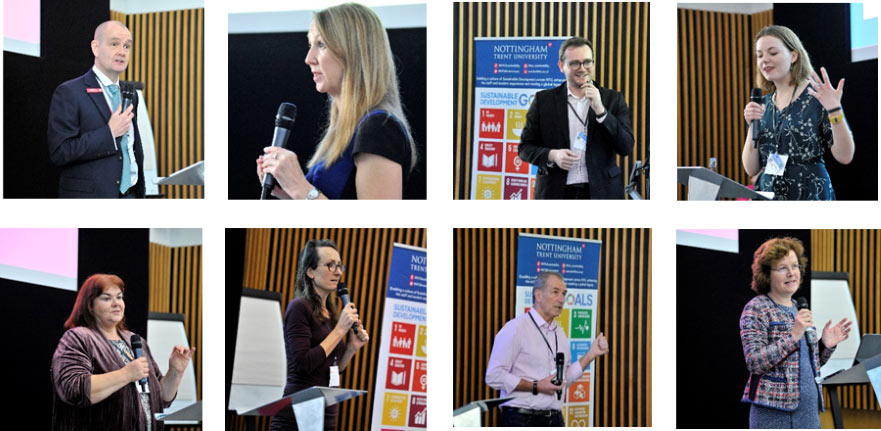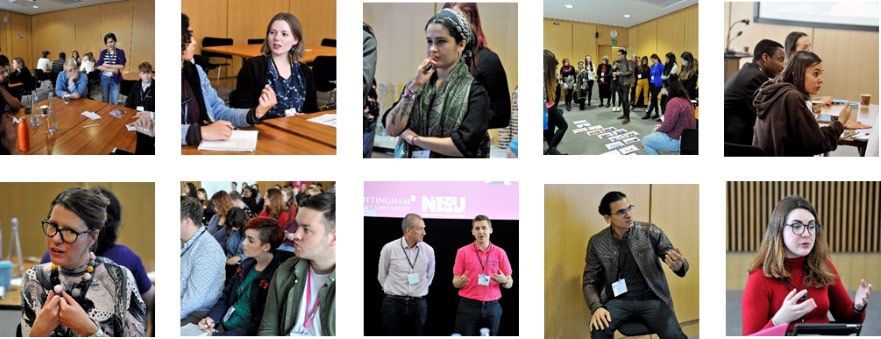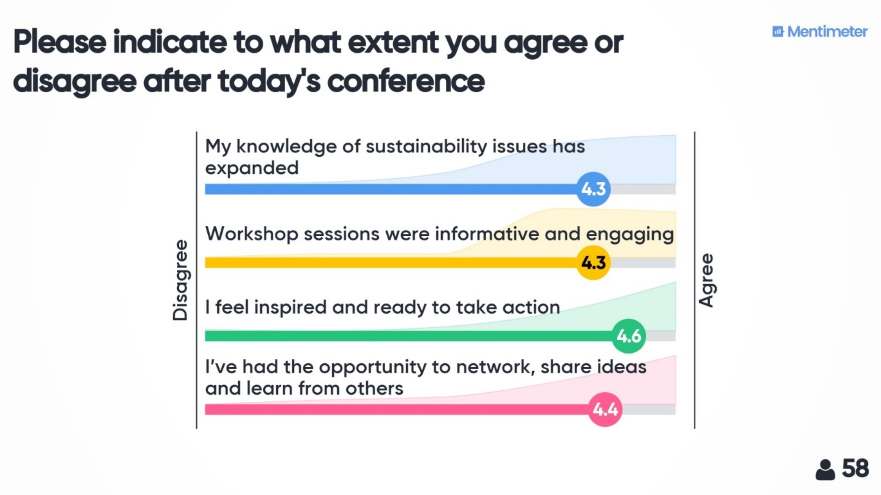Nottingham Sustainability Conference
On 13 November 2019 Nottingham Trent University and Nottingham Trent Students Union jointly hosted the Nottingham Sustainability Conference. Attendees shared ideas and discussed practical ways to effect change and take action on sustainability at their universities and organisations.
The Nottingham Sustainability Conference, jointly organised by Nottingham Trent University (NTU) and Nottingham Trent Students’ Union (NTSU) attracted over 80 attendees ranging from sabbatical elected officers and students representing NTU and thirteen other universities, along with sustainability professionals from across the UK. The day buzzed with activity and enthusiasm as attendees shared ideas and discussed practical ways to effect change and take action at their universities and organisations.
The conference was a success due to the efforts, dedication and enthusiasm of many. We’d like to express our sincere thanks to all the following:
- Speakers and workshop leaders who volunteered their time to share knowledge and inspire action
- Attendees for the enthusiasm, dedication and willingness to share their experiences with each other
- NTSU who collaboratively delivered the sustainability conference
- Prof Eunice Simmons, NTU’s Deputy Vice Chancellor and Steve Denton, NTU’s Chief Operating Officer who opened and closed the event.
- And finally, a huge thank you to our NTU Events and Conferencing team who flawlessly managed the event and to our catering team for preparing a delicious, vegan meal enjoyed by all.
Conference aims
The Nottingham Sustainability Conference aimed to:
- galvanise the UK’s elected sabbatical student officers around current environmental and social issues
- allow attendees to expand sustainability knowledge and identify practical actions to implement
- allow attendees to share ideas and network with other Officers and staff
- jeep the energy and networking alive through creating a dedicated online space.
An ethos of sustainability underpinned the entire event. The day’s activities were planned with waste reduction in mind by keeping paper, plastic and single-use items to a minimum. Lanyards were reused from previous events and collected to be used again. Conference details were printed on seeded paper that can be planted by attendees to grow wildflowers in their local area. Likewise, lunch was vegan, plastic free and managed carefully to avoid creating unnecessary food waste.

Keynote speakers
NTU’s Chief Operating Officer, Steve Denton opened the event and welcomed attendees. This was followed by an informative presentation about the impacts of collaboration from NTU’s Sustainable Development Manager, Charmaine Morrell and NTSU President, Bradley Fox. Inspiring keynote speeches were delivered throughout the day by Claire Sosienski-Smith, Alan Simpson, Penney Poser and Anna Hughes. The conference culminated in an energising closing speech from Deputy Vice Chancellor Eunice Simmons outlining practical tips for engaging with senior leadership and embedding sustainability as a strategic priority.

Workshop sessions
Six informative and interactive workshops were delivered by sustainability experts and focused on climate emergency, food insecurity, plastics waste, and sustainable fashion. Attendees worked in groups to develop ideas and projects and action plans for addressing key challenges in each topic. Knowledge exchange between universities was of particular importance as attendees informally shared solutions that have worked at their institution and common challenges were discussed.
Pledges
All attendees were invited to make a pledge at the end of each session and the pledges ranged from practical next steps to taking collective action at the university level. Pledges were shared verbally as well as up on the screen. Here’s a listing of the 54 pledges that were shared publicly via Mentimeter on the day.
- To cycle to uni 5 days a week.
- Plant 100 trees.
- My pledge is in line with SDG 10 to continue push the University and the sector on changing structures to improve experience and attainment for black students.
- Empower students to carry out sustainable conversations.
- Support sustainable local businesses.
- Reduce buying from fast fashion retailers to 0 in 3 years.
- Buy more locally sourced food.
- To buy clothes from sustainable companies.
- Teach the immediacy of issues.
- Get involved in activism and political action.
- Remind and teach people how to live in a sustainable way by workshops and social media.
- Challenging the SU about their single-use plastic and try to implement more zero-waste products being sold in the SU shop.
- Implement citizens assemblies.
- To have two meat-free days per week.
- We are going to develop a much more extensive Green Policy for TUSU with our Executive team and Sustainability team at Teesside University, whilst improving the University’s impact on the environment.
- Following our Loughborough SU coat sale (from leftover night-out coats), I’m going to contact clubs in Loughborough town to run a similar initiative.
- To buy local food where possible and choose British produce over imported produce.
- Find zero-waste shops in Nottingham.
- Swap clothes with friends.
- To increase awareness amongst peers.
- Think, question, and think again.
- To spread the message on how damaging fast fashion is for the environment and the workers.
- To ensure before I leave this role, SDGs are imbedded in a new university strategic plan jointly with the students union.
- Reduce use and waste of single use plastics and paper.
- Get staff and students trained in carbon literacy and train them to train others.
- Start clothes swap scheme through friends or the uni.
- Find and promote more sustainable options for Christmas presents.
- I will not go vegan. But I will eat less meat.
- Consume more consciously - e.g. fast fashion.
- Drastically reduce all plastic use at the Union.
- Make a conscious decision to shop for ethical clothing that will last longer and therefore buy less fast fashion that is a produce of unethical practice.
- Lobby Universities UK to include climate action / emergency / sustainability on their agenda / priorities.
- To buy longer lasting sustainable clothing and spread the message of how damaging fast fashion is.
- To educate students on food waste and food insecurity. And to encourage students to use food as a way to get involved and build their community.
- Get the University to implement SDGs and zero-waste shops at satellite campuses.
- Advocate, communicate and share info on permaculture and achievable personal actions to help stop climate issues in local communities (focus on young people and working class, forgotten peoples).
- Recycle my inhalers and using my food waste bin more often.
- I also will begin to wash my clothes less and reuse the clothes I already have whilst working hard to get students at Bath Spa to pledge something too.
- Wash clothes less often and swap or buy second hand rather than buy new.
- Support charities that focus on sustainability.
- To work with my colleagues to empower students to make changes. And to work to make that change as easy as possible.
- Organise a catering working group to tackle the issues of packaging, food waste, and food miles.
- Take the train.
- I'm never going to use air travel again.
- To make sure all of my film productions meet (and exceed) the Albert Certification standards and encourage my peers and colleagues to do the same.
- Switch from single use bagged to loose tea leaves.
- Tackle food waste through food planning and ethically sourcing my produce.
- Invite members of the community to events we run, especially on lifelong learning educational events.
- Ride less, eat more veggies, learn more, consume less (buy from used clothes stores), give proper, in-great-condition clothes to those in need, concentrate on what you can do and on the little things.
- To vote Labour.
- To pressure the University to have Meat-Free Mondays.
- Act! (We know so much. How much are we really doing about it?).
- Push the University to embed sustainability into their governance structures so we can stop having the same conversations and actually put those words into action!
- Don’t eat air-freighted veg!
- Speak to people about how to be more sustainable with clothing, e.g. caring for clothes, repair, buying more ethically.

Conference feedback
Throughout the day we asked attendees a series of questions, aiming to gather feedback on various aspects as well as to provide an interactive experience. Results indicated that most attendees felt that collaboration between sabbatical officers and sustainability staff was the way forward while a small percentage (10%) felt that sabbatical officers should take the lead.
Feedback from all six workshops sessions were positive with most attendees indicating they felt ‘Informed and ready to take action!’ after their workshop session. A handful of attendees indicated they ‘could use a bit more information and time to reflect’ after attending a workshop indicating there is room for further discussion around some topics.
The overall feedback for the conference was positive as shown in the graphic from Mentimeter.
Attendees were also asked what worked well at the conference and what could be improved. Useful feedback was provided for both. Here’s a small sample of the responses.
- “The networking — sharing best practice.”
- “It’s been really useful having a mixture of university management, student union staff and university sustainability staff present as we have been able to share knowledge we don’t normally have access to.”
- “The interactive workshops.”
- “Feeling more equipped to inform others about important issues.”
- “Some grand speakers, on interesting and diverse subjects.”
- “The variety of different viewpoints discussed.”
- “Well organized and engaging topics and workshops. Great food!”
- “The Food Instability Workshop was fantastic!”
- “Networking and becoming more confident about taking action.”
- “Maybe a Q&A to look at Union-specific issues.”
- “More detail from the speakers in the workshops and less time discussing on tables.”
- “More workshop events and more time to discuss our conversations.”
- “Going to all the workshops.”
- “Bring more people that are working towards these issues.”
- “East Midlands uni conference — speakers from Loughborough, Leicester etc.”
- “A wider range of topics. Maybe some deeper green discussions and maybe an action plan session.”
Keep the conversation going
To keep the conversation going, share ideas and continue to learn from each other, we've set up a closed Facebook group. Email Sustainability if you'd like the details you need to join.
The Nottingham Sustainability Conference was featured in Penney Poyzer’s weekly food podcast. Check it out on Spotify or on Anchor FM.